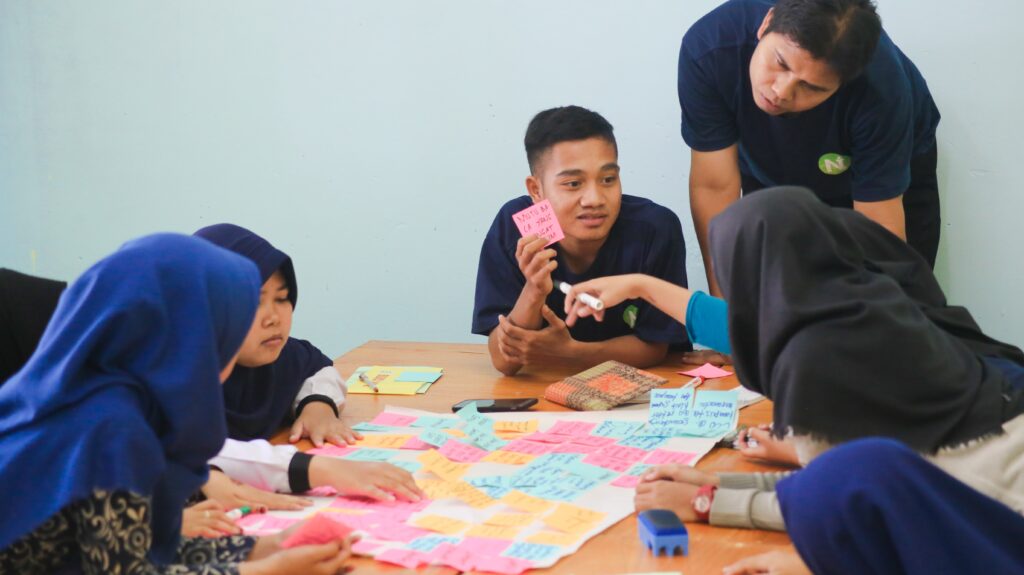Care about the future of philanthropy? Then engage children in philanthropic decision making

Philanthropy plays a fundamental role in civil society, with children and young people globally being one of the most common beneficiaries of philanthropic gifts. Yet children’s voices are all too often absent from philanthropic conversations and decision-making: We frequently ignore their role as current social actors and, importantly, as active members of the philanthropic ecosystem. In this piece, drawing on my own and colleagues’ extensive research into children, youth and philanthropy[1], I briefly consider the arguments for engaging children in philanthropic decision-making and for actively cultivating their philanthropic citizenship, and reflect on what this can mean for philanthropic foundations.
Overall, across my work I seek to present three, interconnected and overlapping arguments. First, not involving children and young people in philanthropic decision-making is counter-intuitive to cultivating their philanthropic citizenship. Second, that traditional, non-participative engagement of children and young people in philanthropic activities can perpetuate the very inequalities and inequity we seek to address as a sector. Third, and perhaps most crucially, that the active and meaningful participation of children and young people in philanthropic decision-making doesn’t just benefit those children and young people who participate, and of course the outputs of philanthropy, it benefits philanthropy itself.
Argument 1: Not involving children and young people in philanthropic decision-making is counter-intuitive to cultivating their philanthropic citizenship.
From taking part in climate change protests, fundraising through telethon appeals, donating to foodbanks, participating in litter picks or helping the homeless, children and young people across the globe regularly display a multitude of formal and informal philanthropic behaviours. As well as providing vital support for many worthy causes, the hope is that engaging children in philanthropic acts helps develop “habits” of giving that stay with them throughout their lives. Nonetheless, while much of the discussion around philanthropy focuses on how to get more people to give more money more frequently, children intrinsically view philanthropy from a different perspective. Our research shows that children’s ideas of philanthropy and charity are not just an “act” to celebrate but an embodiment of a set of behaviours, actions and values that are rooted in kindness, fairness and empathy – the very building blocks of justice, equality and democracy. We refer to this as children’s and young people’s philanthropic citizenship, which we define as “a dimension of citizenship behaviour, associated with intentions and actions that intend to produce public benefit, for example volunteering, social action, charitable giving, advocacy and activism”.
Nurturing this intrinsic sense of “fellow feeling” – that is the emotional connection of empathy, sympathy and concern – is important. However, when it comes to voluntary action and charitable giving, children are frequently not engaged in decisions as to who they give to, how they give or why, or indeed engaged in designing or developing the services provided. Instead, more commonly, philanthropic decisions are imposed upon them by adults, often as part of large-scale, national fundraising or volunteering campaigns, or through acts of benevolence and the provision of services. By imposing these philanthropic decisions on children, without allowing them to critically engage in the cause area and issues being addressed, there is a risk that philanthropy is promoted as a simple economic “transactional process”, overriding intrinsic philanthropic behaviours, actions and values. As well as shifting ideas of philanthropy away from a sense of fellow feeling, this economic focus potentially reduces children’s learning about philanthropy to being simply about funding, rather than the wider, holistic social change that non-profits and philanthropic institutions seek to achieve. This is counter-intuitive to cultivating active, long-term philanthropic citizens.
Argument 2: Traditional, non-participative engagement of children and young people in philanthropic activities can perpetuate the very inequalities and inequity we seek to address as a sector.
Here lies a concern that by not encouraging and facilitating children to critically engage in philanthropic giving decisions, we promote the idea that charity can solve social ills, without considering systemic injustice which facilitates social concerns and, indeed, critically engaging with the notion of philanthropy itself. For example, we can encourage people to support food banks, but without facilitating them to critically question and challenge the social injustices and wealth inequalities which lead to food poverty, we do little to help solve the wider issue.
Consider the narratives our children commonly hear about philanthropy, through media, literature and from non-profits themselves. Philanthropic stories are often centred around a single benevolent hero, who acts as the saviour of the poor and innocent; rather than discussing the more nuanced and realistic ecosystem of individuals and communities coming together to critically question the perpetuation of injustice which underpins the situation. As research highlights, while such stories often celebrate the hero, they equally “otherise” individuals and communities as objects of pity and charity. At best, this portrays philanthropy as simply an act of benevolence by the privileged, instead of a process which seeks to work towards making a better world “with” (rather than “for”) others; at worse it further marginalises and diminishes the voices of the very communities philanthropy seeks to support.
As beneficiary, donor or observer in these worst-case scenario situations, the message children receive is clear, “people receiving philanthropic support do not know what is best for them and lack the expertise to contribute to new ways of being”; thus, we continue to promote ideas of inequity, inequality and paternalism. Furthermore, the focus on transactional, economic approaches within philanthropic narratives risks minimising all other, and arguably much more inclusive and just as important, acts of philanthropic citizenship needed to promote social change, such as advocacy, volunteering and activism.
Given brevity of space, I perhaps purposefully focus on the extremes of this argument, nonetheless these messages are fundamentally counter-intuitive to long-term goals of provoking social change. Simply put, we cannot solve social ills and build a strong and just society without drawing together all parts of the philanthropic ecosystem to help change the system itself; including mobilising and supporting marginalised individuals and communities, while simultaneously recognising the deeply rooted power imbalances which underpin philanthropy and actively seeking to address these. As experts of their own lives and own experiences, children are an important part of this ecosystem, as active beneficiaries, donors, advocates, volunteers and social actors, and thus need to be invited to be part of the problem solving, along with other marginalised communities.
Argument 3: The active and meaningful participation of children and young people in philanthropic decision-making doesn’t just benefit those children and young people who participate, and of course the outputs of philanthropy, it benefits philanthropy itself.
In accepting arguments 1 and 2, this 3rd argument becomes relatively straightforward. Throughout this report we witness just how important meaningful participation in philanthropic decision-making is both for children and young people themselves and the outputs of philanthropy. I want to extend this argument to say that it is also good for philanthropy itself. Nurturing children’s philanthropic citizenship matters: It matters in terms of both creating more meaningful and inclusive philanthropy now, and in terms of greater democratisation of philanthropy in the future. Drawing on findings from student philanthropy programmes across the United States and Europe for example, research consistently highlights the benefits of children and young people’s active participation in philanthropic decision-making, including increased volunteering and giving; heightened awareness of social problems; greater commitment to ideas of social justice and equality; strengthened philanthropic knowledge and skills; increased leadership skills; and greater community engagement. Indeed, a small handful of studies have also shown the longer-term effects on children and young people who have participated in student philanthropy and participation programmes, including volunteering up to two-and-a-half times the rate of the general population and serving on non-profit boards at three times the rate of the general population.
Adopting a children’s rights approach to this participation, means we acknowledge children and young people as capable, social actors who are experts of their own lives and their own experiences – as current citizens who should be facilitated to help shape the world they are part of and not simply viewed as future citizens to mould into existing systems and structures. Engaging children and young people in philanthropic decision-making should not simply be about developing a rhetoric about how to grow children as future donors within these current systems and structures, but instead should question how we can support and facilitate children and young people to critically question these systems and structures and consider different ways of being; ways of being which foster ideas of equity and social justice, and promote ideas of the interdependence of all parts of the philanthropic ecosystem in achieving social change, including the role of volunteering, advocacy, campaigning and lobbying governments.
The great news is, as we see throughout this report, many foundations and philanthropic institutions are embracing children’s voices in their decision-making. As we all work to continuously improve philanthropy ‒ to increase equity, inclusivity and equality in philanthropic decision-making ‒ the role of foundations becomes ever more important. Indeed, foundations are well placed to counter problematic narratives and offer alternative examples of inclusive, community-centred philanthropic practices which recognise and indeed prioritise children’s voices. Fundamentally improving practice in philanthropy requires cultural change, and cultural change is always a journey on which different actors will be at different points: Nonetheless, as long as we are all seeking to progress, the future is promising. Successful participation of children and young people will look different in different philanthropic institutions but starting with some basic questions such as; are we offering transparent, informative, voluntary, inclusive and respectful opportunities for all children to participate; are these opportunities relevant and meaningful for children and appropriately supported by critical engagement with the topic; how are we engaging children (or at a minimum, moving towards engaging) as partners in decision-making which affects them; what does successful participation of children look like to us; and how are we cultivating children’s philanthropic citizenship?
In summary, philanthropy provides a space for children and young people to explore social, environmental and political issues in a proactive, empowering way. If children and young people are to be recognised as the capable and powerful social actors that they are, and as current citizens operating in a complex world, then it is imperative that they are provided with meaningful and appropriate opportunities to critically explore and act on these ideas.
Excerpted from the report, “Child and Youth Participation in Philanthropy”, published in May 2022 by Philea.
Authors

